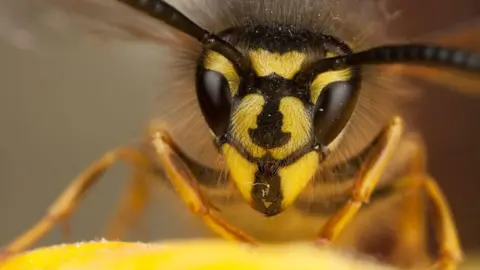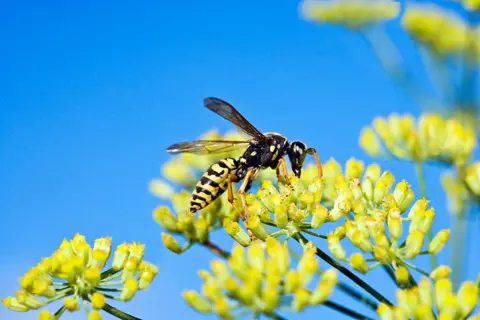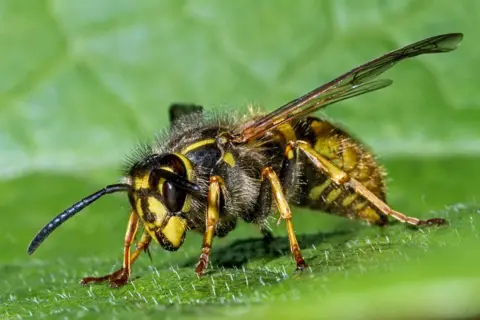Wasps are back this summer – a lot of them
 Getty Images
Getty ImagesJohn Horsley was gardening when he felt a wasp crawl down his T-shirt.
"That stung me a few times in the back," he says. "It wasn't a pleasant experience."
Part of the British Pest Control Association, John is well-versed in the problems wasps can cause gate-crashing picnics or beer gardens on a summer's day, and building bothersome nests.
After a downtick in wasp callouts in recent summers, his industry has been busier than usual tackling problems caused by wasps this year, he says. These can include large nests appearing earlier in the season.
Wasps are currently still raising their young, but later in the summer they tend to congregate in public areas seeking a sugary snack before they die.
So is this shaping up to be a summer of the wasp? "We don't have plagues of insects," Mr Horsley explains. "But it seems that every few years, wasps will have a strong year and that commonly coincides with particular weather patterns – this year it's been very warm and very dry – it's been a very good year for them."
The Met Office says we have had the warmest spring in more than 50 years. Last year, the UK had its coolest summer for nine years.
One of the world's leading wasp experts, Prof Seirian Sumner of University College London, cautions that scientific data on wasp numbers will not be released for a while.
But her gut feeling is that "all the signs are, based on the weather and other insect populations, it is going to be a good year for wasps".
 Getty Images
Getty ImagesThe UK has about 9,000 species of wasps - most of them solitary, meaning they don't live in large colonies and are generally not a nuisance to humans.
Only a small number are social wasps, such as the common wasp, Vespula vulgaris, which is most common for interacting with humans. According to a 2021 YouGov poll, they are the second most disliked insect, bug or creepy-crawly in the UK, after the spider.
But Prof Sumner and other wasp experts point out that wasps are not all bad.
"They are really important parts of the ecosystem – they're apex predators," she says.
"Take a top predator out of any system – like the lion out of Serengeti – it has knock-on effects in the prey populations that will then go unchecked by their predator.
"And wasps are free, natural pest controllers – so they are doing jobs in our gardens, in our wild landscapes, in our farming landscapes. They are helping keep pests at bay."
Living alongside wasps - without being stung
Nikki Banfield, of the insect charity Buglife, says we need to look after wasps.
"A lot of people don't like wasps, they class them as angry bees, but they have a really valid purpose in the natural world," she says.
In that wider natural world, recent studies show widespread declines in global insect populations, with some insect species being pushed towards extinction.
 Getty Images
Getty ImagesInsect loss is linked to intensive agriculture, pesticides and climate change, with far-reaching consequences for the many birds, amphibians, bats and reptiles that rely on insects for food.
But the common wasp appears to be bucking this trend – its population remaining stable over the past 100 years – along with houseflies, cockroaches and the European hornet, which is increasing across the UK and moving northward as the climate warms.
Sightings of the invading Asian or yellow-legged hornet, which arrived in the UK in 2016, are also on the rise.
And after a poor year for butterflies in 2024, naturalists say many common species, such as the Large White, also appear to be flourishing this summer.
Ladybirds too, seem to be enjoying the warmer temperatures, according to experts.
So, luckily for the ecosystem – but perhaps unluckily for our picnics – wasps appear to be thriving here in the UK.
How can we live alongside each other happily then?
 Getty Images
Getty ImagesMs Banfield suggests we leave something sweet, such as a small cap of jam or orange juice, a short distance from the picnic area to distract the insects.
Other practical tips include not screaming, flapping your arms or swatting at wasps, as this will agitate them and make them more aggressive.
Wasp stings can pose a public health risk – they can cause anaphylactic shock - Mr Horsley points out, so he has a word of advice.
"Don't disturb them. Try and stay away from them where possible, and, if it needs to be treated then speak to a professional," he says.
